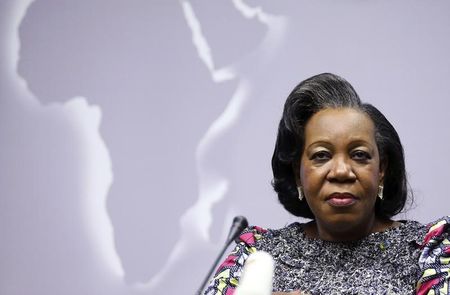Central African rebels reject new PM, refuse to join government

By Crispin Dembassa-Kette
BANGUI (Reuters) – Central African Republic’s northern Seleka rebels said on Monday they would not take part in a national unity government as they were not consulted about the choice of prime minister and said they may rethink last month’s ceasefire deal.
Interim President Catherine Samba Panza named Mahamat Kamoun on Sunday as the country’s first Muslim prime minister.
He is tasked with forming a consensus government and guiding Central African Republic to elections next year in a bid to end sectarian violence that has killed thousands of people and displaced around 1 million.
Samba Panza took office in January when Seleka leader Michel Djotodia resigned amid an international outcry over abuses by the mostly Muslim rebels after they seized power in March 2013 in the majority Christian country. Christian ‘anti-balaka’ militia took up arms against them.
Kamoun, an economist, was the cabinet chief for Djotodia during his presidency but the rebels say he is not a member of Seleka. Kamoun has served as an adviser to Samba Panza since Djotodia’s resignation.
“The transitional head of state did not think to open talks with Seleka and just decided to name a prime minister,” General Mohamed Mousa Dhaffane, Seleka’s second vice-president, said in a statement.
“Seleka has decided to not participate in the next government,” Dhaffane said, adding the rebels could also rethink a ceasefire deal agreed last month in the capital of neighbouring Congo Republic.
When Seleka withdrew from the southern capital Bangui after Djotodia’s resignation, tens of thousands of Muslims fled militia reprisals to a northern rebel enclave. Persistent fighting on the edge of rebel territory has undermined the ceasefire with the ‘anti-balaka’ militia.
An ‘anti-balaka’ spokesman said they were happy with Kamoun’s nomination and would take part in a unity government.
Speaking on state radio, Kamoun said he would name a cabinet of about 26 members. It would focus on reestablishing security, improving the humanitarian situation, fostering national reconciliation, relaunching government administration and the economy, and organising elections, he said.
France deployed 2,000 peacekeepers from December to stem the sectarian violence. The United Nations is due to deploy a 12,000-strong peacekeeping mission next month, much of it made up of a 6,000-strong African mission already on the ground.
(Writing by Daniel Flynn; Editing by Janet Lawrence)